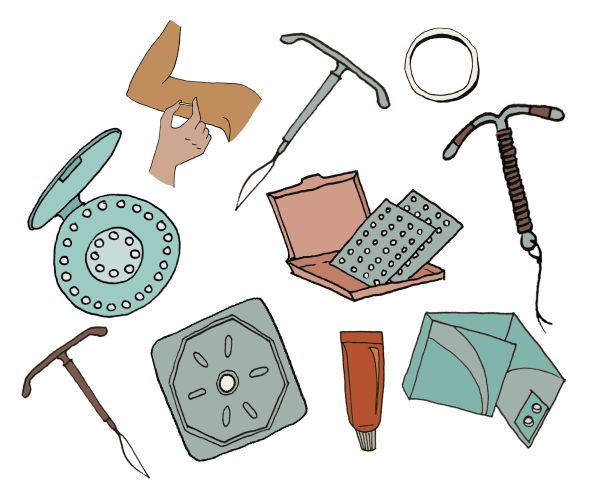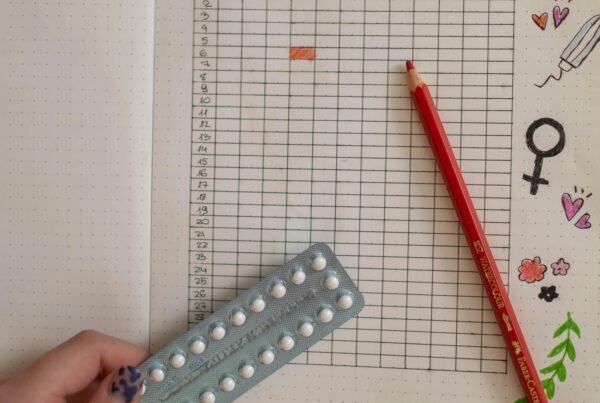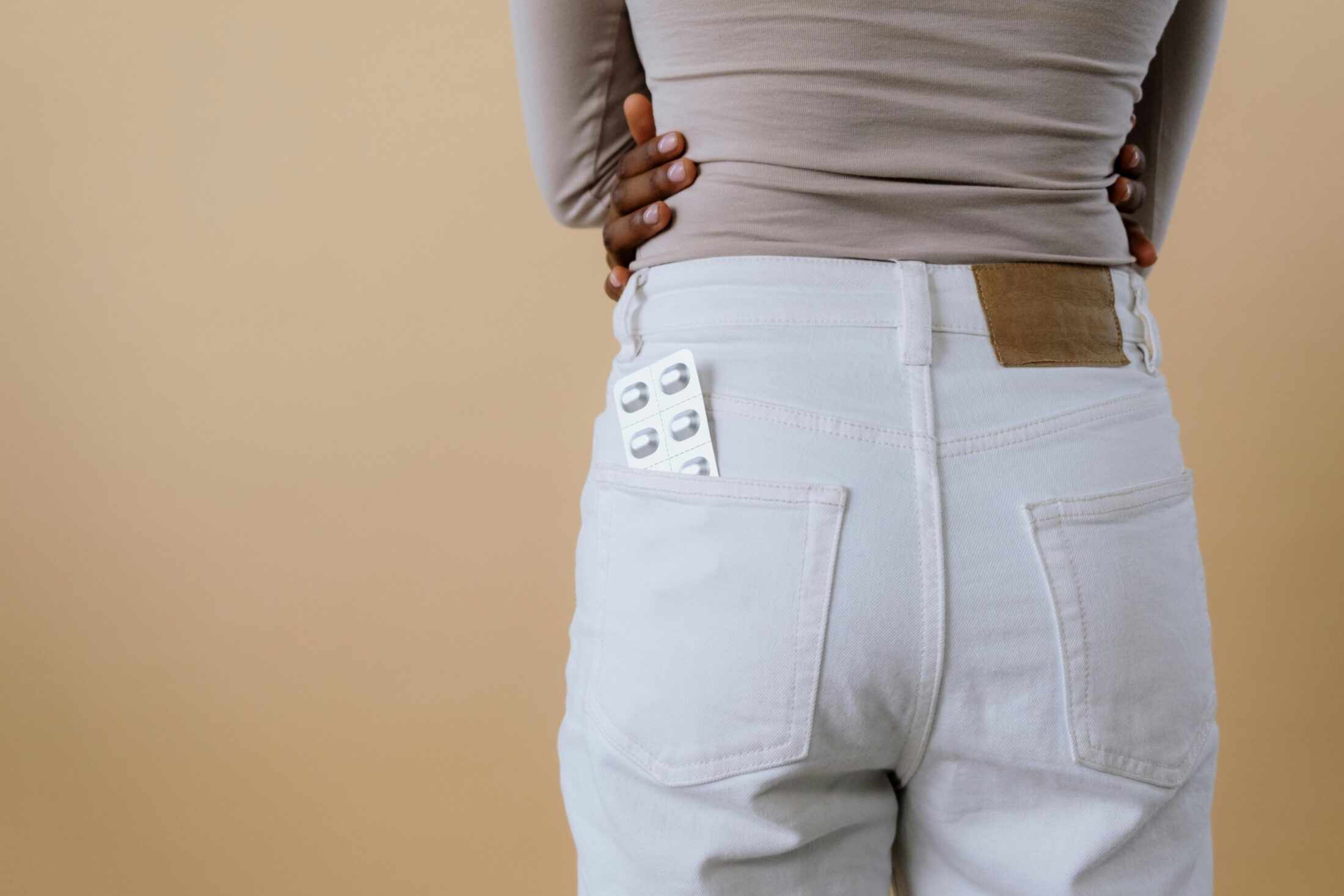Your rights could be at stake
Hormonal contraceptives are used by more than 70 million women in the US, and contrary to what you may know they’re used widely to help manage a variety of conditions, as well as to support family planning. Why is this important for us to know and understand? Organizations like Americans for Contraception are sounding the alarm that our freedom to use contraceptives is at risk, and the impact of this could seriously affect you or someone you love.
Our hormonal health affects every part of our body. From brains to biceps, your hormonal makeup plays a key role in ensuring you remain feeling well. When balance is disrupted, we feel the impact. What’s more, we are all unique individuals. Reactions to these complex chemical compounds will vary from person to person. For instance, while you may feel tip top when your progesterone is running hot, this isn’t the case for everyone.
Because of this, clinicians regularly prescribe hormonal medications to support us when changing hormone levels are the culprit for causing symptoms. Contraceptives can support our:
Physical health
Conditions such as endometriosis, polycystic ovarian syndrome (PCOS), fibroids, abnormal uterine bleeding, and painful menstruation are often treated with hormonal contraceptives.
Mental health
Contraceptives can be used to help support with mood-related issues triggered by hormonal changes. This includes postpartum depression (PPD) premenstrual syndrome (PMS) and premenstrual dysphoric disorder (PMDD).
Healthy aging
In mid to later life our hormone levels decline when we enter perimenopause and menopause. Not only do contraceptive options such as the hormonal IUD help to manage menopausal symptoms, they guard against the development of conditions associated with aging.
Blocking access to these medications not only impacts women’s reproductive autonomy, it leaves millions of Americans struggling to manage chronic health conditions that are accompanied by a variety of debilitating symptoms.
Not convinced? Our team of experts has plenty more to tell you about how access to contraception helps to support the lives of millions of Americans, and the wider US healthcare economy. So keep scrolling to learn more about the importance of contraceptives and find out what you can do to help protect our rights.
Hormonal Contraceptives 101
We may all think we know what contraceptives are, but a basic biology recap never hurts!
What are hormonal contraceptives?
- Hormonal contraceptives are medications and devices that help to control and regulate the levels of hormones called estrogen and/or progesterone in the body.
- Some of these contraceptives can help to suppress ovulation, thicken the cervical mucus and thin the uterine lining.
- There are over a dozen different types of hormonal contraceptives currently available. Options include oral medications (taken by mouth), injections, implants (placed under the skin), rings (placed into the vagina), patches and devices such as IUDs (placed into the uterus).
What are these medications and devices used for?
Hormonal contraceptives are a multipurpose treatment option. In addition to preventing pregnancy, the regulation provided by these contraceptives help to effectively manage the symptoms of numerous conditions that are tied to our hormone levels.
Who uses hormonal contraceptives?
Hormonal contraceptives are used by millions of Americans at all stages of life, from those who have just begun to menstruate to those who are going through menopause. We use hormonal contraceptives to support our physical health, mental health, and healthy aging.

.
Beyond Birth Control
1. Hormonal contraceptives help women manage physical symptoms
For the millions of women who have chronic conditions such as PCOS, fibroids, and endometriosis, hormonal contraceptives are essential treatments that are used to:
- Relieve pain and discomfort.
- Reduce heavy bleeding.
- Promote menstrual cycle regulation.
- Manage symptoms such as acne and facial hair growth.
PCOS
Oral contraceptive medications that contain both estrogen and progesterone are the go-to treatments for women who have PCOS.
Like other chronic conditions, there is no “cure” for PCOS, but women who have PCOS can use contraceptives to aid in hormonal and menstrual cycle regulation, which helps to improve fertility, reduce symptoms such as hair thinning on the head, and reduce the risk of developing other major health conditions such as uterine cancer.
Fibroids
For women with fibroids (non cancerous uterine growths), low dose contraceptive medications and hormonal intrauterine devices (IUDs) are essential to the management of the condition. Hormonal contraceptives reduce fibroid growth and improve symptoms of pain and heavy bleeding.
Studies also show that using hormonal contraceptive medications could reduce the chances of a woman developing fibroids in the first place. The bottom line? Without access to these medications, more women could suffer, and we would need to resort to more invasive and expensive treatment options such as surgery!
Endometriosis
Similarly to PCOS and fibroids, endometriosis impacts women throughout their reproductive lifespan. If severe pain and heavy bleeding weren’t enough to contend with, the infertility women often experience as a result of endometriosis can be emotionally and physically devastating and disrupt their lives.
A variety of hormonal contraceptives, including medications that contain estrogen and progesterone and progesterone alone can be used to minimize symptoms, and in some cases minimize the progression of the condition.
2. Hormonal contraceptives improve mental health
Hormonal contraceptive medications help women to reduce the experience of mental health symptoms that are triggered by hormonal changes. This can include:
- Depression
- Anxiety
- Fatigue or tiredness
- Emotional instability
- Cognitive issues
- Issues with sleep
For hormonally-triggered mental health issues, contraceptives can be prescribed alone, or as part of a treatment plan that can also include selective serotonin reuptake inhibitors (SSRIs) and talk-therapies.
Hormonal contraceptives are particularly useful for treating conditions such as PMS, PMDD, and PPD. This is because there is a strong connection between our changing hormone levels and the onset of symptoms, and conditions such as PMS, PMDD and PPD follow a clear pattern that relates to hormonal fluctuations over the course of the menstrual cycle or after giving birth.
For people with PMS and PMDD, the luteal phase of their cycle (the period after ovulation leading up to a period) is particularly challenging. The sudden drop in estrogen, followed by a gradual rise in progesterone, can lead to intense symptoms including difficulty regulating emotions and even suicidal thoughts.
The contraceptive options most popular for treating conditions such as PMS, PMDD, and PPD include oral contraceptive medications that have fewer or no “off” days, and other contraceptive devices that help us maintain our hormone levels with minimal fluctuations.
In reducing fluctuations, these medications have a ‘preventative’ effect, and help women to experience fewer symptoms rather than other medications or therapies that simply treat symptoms. Basically, hormonal contraceptives address the root cause of the issue, as opposed to simply treating the symptoms as they arise.
Without these hormonal contraceptives, women with conditions such as PMS, PMDD, and PPD would have to endure symptoms that impact their lives severely. People living with these conditions struggle to maintain both their professional and personal lives, with many women reporting “I get one good week out of the month to work with”.
3. Hormonal contraceptives support healthy aging
During perimenopause, estrogen and progesterone levels begin to rise and fall more erratically, before levels drop as we enter menopause. Changing hormone levels cause many women to experience symptoms that include more than what you’ve seen on TV. As well as the hot flashes, women in perimenopause and menopause regularly experience:
- Changes to their mood.
- Changes to their menstrual bleeding (periods often become heavier and more painful).
- Vulvovaginal symptoms including vaginal dryness and tissue changes.
- Cognitive changes, such as difficulty concentrating (this is often called ‘brain fog’).
- Changes to their libido or sex drive.
- Feeling fatigued or exhausted.
Did you know there are over 34 symptoms associated with perimenopause and menopause? And even though 80% of women report feeling impacted, many women still face barriers in accessing Hormone Therapy (HT) to help treat symptoms.
Hormonal IUDs are regularly prescribed by clinicians because they not only provide a means to prevent pregnancy in perimenopause, they also deliver the progesterone component of a women’s HT that is essential in helping to alleviate menopausal symptoms.
As well as addressing menstrual irregularity, heavy menstrual bleeding, and painful periods, some oral contraceptives can also support bone health, improve vasomotor symptoms (hot flashes and night sweats), and reduce the risk of ovarian and endometrial cancer for women in perimenopause. Similarly, injectable contraceptive medications have been shown to improve vasomotor symptoms and reduce the risk of ovarian, endometrial and colorectal cancer.
Hormonal contraceptives are an essential part of the perimenopausal and menopausal treatment tool-kit.

Protecting our Rights
Whether you use hormonal contraceptives to help manage your health or to help prevent pregnancy, access to hormonal contraceptives should be your right. This is a sentiment we know is shared by the majority of Americans.
Two Supreme Court decisions established the right to contraception in the ‘60s and ‘70s, but these decisions could be overturned if an appeal is brought to the presiding Supreme Court, which could limit or block our ability to use hormonal contraceptives.
Unfortunately, some prominent figures have expressed a willingness to overturn the constitutional right to contraception. For example, Justice Clarence Thomas has written that the Supreme Court should “reconsider” Griswold v. Connecticut, the 1965 decision that established married couples’ right to contraception.
Some elected officials have tried to protect access to birth control with the Right to Contraception Act, a bill that would enshrine the right to access and use contraceptives in federal law. But Republican politicians have blocked it repeatedly. They are even introducing “personhood” bills that could make some forms of hormonal contraception illegal.
Americans for Contraception is tracking the situation and here’s what they’ve seen:
- On June 5, 2024, the majority of Republican senators voted against the Right to Contraception Act.
- In 2022, more than 90% of Republicans in the House of Representatives voted against the Right to Contraception Act.
- Republican Governor Joe Lombardo vetoed Nevada’s Right to Contraception Act, even though it passed with bipartisan support.
- In Virginia, Governor Glenn Youngkin also vetoed the Right to Contraception Act.
- Georgia Governor Brian Kemp was caught on audio saying he was open to banning contraception.
- Mississippi Governor Tate Reeves refused to rule out banning contraception.
- Legislators in at least 14 states have introduced “personhood” bills, which could enable them to ban certain forms of birth control by redefining when life begins.
What could this mean for you? It depends on where you live. If the Right to Contraception Act does not become law, and a “personhood” law is passed in your state, you could lose access to certain hormonal contraceptives. IUDs and Plan B are particularly at risk.
Learn more about possible threats at AFCEdFund.org.

The Birth-Control Bottom Line
If you thought conversations about contraceptives only addressed the topic of pregnancy prevention, think again. Hormonal contraceptives are an effective and necessary treatment option used to treat a variety of conditions driven by changes to our hormone levels. If these essential medications and treatments are taken away from us, many women will suffer needlessly with chronic symptoms that affect both their physical and mental health.
Currently, 1 in 10 women will stop working because hormonal symptoms have become too debilitating. 1 in 6 women struggling with endometriosis will lose their jobs. 8 million women are currently experiencing symptoms of postpartum depression. What will happen to these figures if we remove one of the only reliable sources of support these women have access to in order to cope?
Taking away access to contraceptives places pressure on an overloaded healthcare system to perform unnecessary procedures to treat conditions that could be managed effectively with contraceptives. Without the ability to regulate or suppress ovulation, you leave few options for women beyond a hysterectomy. This places women’s lives at risk, places clinical professionals in an unethical care position and increases strain on the healthcare economy. The solution is simple. Protect our rights to contraceptives to protect our rights to health.
From IUDs to the pill, hormonal contraceptives help Americans live free. Make sure you know where your elected representatives stand on the right to contraception.
This blog post was authored in collaboration with Americans for Contraception.
References
Allen RH, Cwiak CA, Kaunitz AM. Contraception in women over 40 years of age. CMAJ. 2013;185(7):565-573. doi:10.1503/cmaj.121280
Al-Hendy A, Myers ER, Stewart E. Uterine Fibroids: Burden and Unmet Medical Need. Semin Reprod Med. 2017;35(6):473-480. doi:10.1055/s-0037-1607264
Cho MK. Use of Combined Oral Contraceptives in Perimenopausal Women. Chonnam Med J. 2018 Sep;54(3):153-158. doi: 10.4068/cmj.2018.54.3.153. Epub 2018 Sep 27. PMID: 30288370; PMCID: PMC6165915.
Gliklich R, Leavy M, Velentgas P, Campion D. Identification of future research needs in the comparative management of uterine fibroid disease: A report on the priority-setting process, preliminary data analysis, and research plan. [Internet]. AHRQ Effective health care program research reports. 2011.
Grandi G, Barra F, Ferrero S, et al. Hormonal contraception in women with endometriosis: a systematic review. Eur J Contracept Reprod Health Care. 2019;24(1):61-70. doi:10.1080/13625187.2018.1550576
Halbreich U, Borenstein J, Pearlstein T, Kahn LS. The prevalence, impairment, impact, and burden of premenstrual dysphoric disorder (PMS/PMDD). Psychoneuroendocrinology. 2003 Aug;28 Suppl 3:1-23. doi: 10.1016/s0306-4530(03)00098-2. PMID: 12892987.
Hoffman SR, Smith JS, Funk MJ, et al. Combined oral contraceptive utilization and uterine fibroid incidence: A prospective study in a cohort of African-American women. PLoS One. 2024;19(5):e0303823. Published 2024 May 23. doi:10.1371/journal.pone.0303823
Kwas K, Nowakowska A, Fornalczyk A, et al. Impact of Contraception on Uterine Fibroids. Medicina (Kaunas). 2021;57(7):717. Published 2021 Jul 16. doi:10.3390/medicina57070717
Parasar P, Ozcan P, Terry KL. Endometriosis: Epidemiology, Diagnosis and Clinical Management. Curr Obstet Gynecol Rep. 2017;6(1):34-41. doi:10.1007/s13669-017-0187-1
Spritzer PM. Contraception for Women with Polycystic Ovary Syndrome: Dealing with a Complex Condition. Rev Bras Ginecol Obstet. 2022;44(4):325-326. doi:10.1055/s-0042-1748036
Teede HJ, Misso ML, Costello MF, et al. Recommendations from the international evidence-based guideline for the assessment and management of polycystic ovary syndrome. Fertil Steril. 2018;110(3):364-379. doi:10.1016/j.fertnstert.2018.05.004
Weisberg E, Fraser IS. Contraception and endometriosis: challenges, efficacy, and therapeutic importance. Open Access J Contracept. 2015;6:105-115. Published 2015 Jul 27. doi:10.2147/OAJC.S56400
Wolf WM, Wattick RA, Kinkade ON, Olfert MD. Geographical Prevalence of Polycystic Ovary Syndrome as Determined by Region and Race/Ethnicity. Int J Environ Res Public Health. 2018;15(11):2589. Published 2018 Nov 20. doi:10.3390/ijerph15112589







